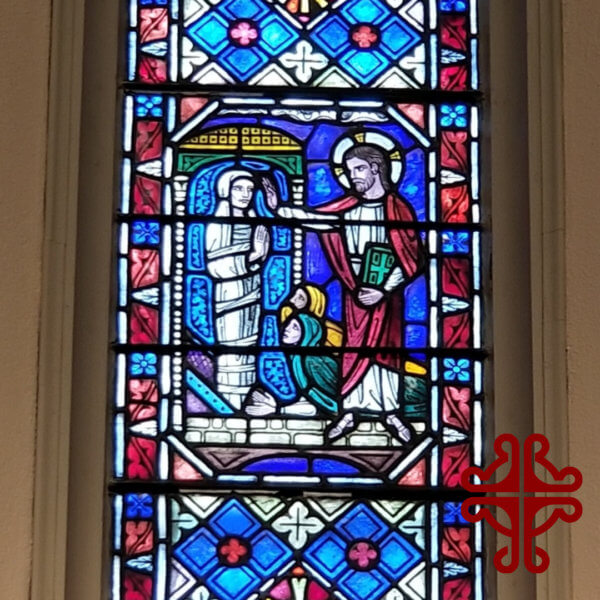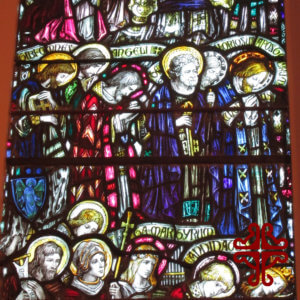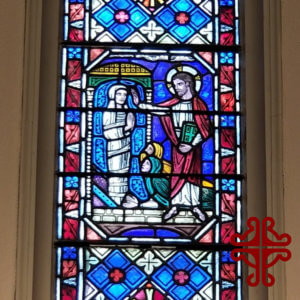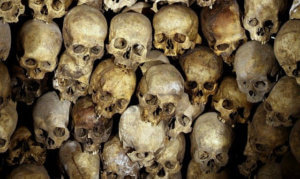
 Friends, this has been a week full of new things, and of doing old things in new ways. We’re all staying home now, instead of meeting at work, at school, at church, at the gym, in restaurants, and even at the movies. Instead of gathering together in our communities like we’re used to doing, we are at home, some of us on our own, and others with our “quarantine buddies,” as our daughter refers to them, whether human, furry, or even feathered. But in this paradoxical time of profound isolation — with all of us divided up inside our own houses, outside only for walks and then strictly observing physical distance — we are more together than we have been for a long time, maybe even ever in our experience.
Friends, this has been a week full of new things, and of doing old things in new ways. We’re all staying home now, instead of meeting at work, at school, at church, at the gym, in restaurants, and even at the movies. Instead of gathering together in our communities like we’re used to doing, we are at home, some of us on our own, and others with our “quarantine buddies,” as our daughter refers to them, whether human, furry, or even feathered. But in this paradoxical time of profound isolation — with all of us divided up inside our own houses, outside only for walks and then strictly observing physical distance — we are more together than we have been for a long time, maybe even ever in our experience.
One thing that helps us stay together is our windows. We can look through our windows from our isolation into the yard, or out to the street. And we can also look through the windows of our iPhones, iPads, Androids, or computers into the outside world, and join in our neighbors’ experience. Through our WiFi windows, we can see the streets of Atlanta, or New York, and join as everyone within shouting distance leans out their windows to cheer the healthcare workers as they change shifts every day.
And we have also learned more about COVID19, and how the coronavirus that causes it is transmitted. It’s that new science that brings us together this way today. Jere and I have really wanted to have you all over, but we hadn’t imagined it would be quite like this!
Closed for Public Worship
We now know that our churches will be closed for public worship and in-person meetings at least through Easter, but we really should anticipate that we will be closed longer. We are working on the virus’s schedule, not our own.
Our learning curve this past week was steep! We learned that we are safest if we don’t “zone switch,” as my adult children say, meaning that it’s best if we stick with our quarantine buddy and don’t interact in person with others. For us at Emmanuel, this means that we cannot continue our streaming worship from the church, because even with our spare worship team of six, we had five instances of “zone switching” going on ( Jere and I count as one zone).
But this is a time of creativity, curiosity, and imagination. A whole lot of things have changed just in the past week. Just look at where we are now! And the thing is, we can look — right through our WiFi windows — and we can still join in community, to worship and pray.
Community
In a New York Times OpEd piece this week, columnist David Brooks quoted Viktor Frankl, who wrote at the time of the Holocaust that we don’t get to choose our difficulties, but we do have the freedom to select our responses. We make meaning at these times through the work we offer, the love we give, and our ability to display courage in the face of suffering. Frankel’s words have special relevance this week, as we worship together while staying apart — our own QBZs — Quarantine Buddy Zones. Frankel’s words really mean something, especially from our silos of physical distance and as we read this week of God’s call to dry bones to live, and God’s breath that brings Lazarus back to life.
 It can be lonely in our separate places, and the constant updates, analysis, and rising infection rates can keep us in a state of rising anxiety. We hear that anxiety in the wrenching immediacy of Martha’s words in our gospel today: Lord, if you had been here, my brother would not have died. I’ve always focused on the sisters — Mary and Martha — in this passage. I don’t know — maybe because they’re women — sisters — and women aren’t written about as frequently in scripture. Or maybe because they are actors — people with agency — in this story. They send a message to Jesus while he’s teaching down at the Jordan River, that their brother Lazarus is ill. They’re all busy and walking around, doing things, and not isolated and stuck in their houses. First Martha and then Mary each walk separately to meet Jesus on his way into their village of Bethany, expressing their sorrow, their disappointment, and maybe even their reproach. Lord, if you had been here, my brother would not have died.
It can be lonely in our separate places, and the constant updates, analysis, and rising infection rates can keep us in a state of rising anxiety. We hear that anxiety in the wrenching immediacy of Martha’s words in our gospel today: Lord, if you had been here, my brother would not have died. I’ve always focused on the sisters — Mary and Martha — in this passage. I don’t know — maybe because they’re women — sisters — and women aren’t written about as frequently in scripture. Or maybe because they are actors — people with agency — in this story. They send a message to Jesus while he’s teaching down at the Jordan River, that their brother Lazarus is ill. They’re all busy and walking around, doing things, and not isolated and stuck in their houses. First Martha and then Mary each walk separately to meet Jesus on his way into their village of Bethany, expressing their sorrow, their disappointment, and maybe even their reproach. Lord, if you had been here, my brother would not have died.
We can feel Martha’s deep well of grief as she says her first words to Jesus — her friend whom she loves — Lord, if you had been here, my brother would not have died. It’s funny, though, how different times and circumstances can change our perspective. Maybe because we’re all at home — walled in and isolated — I found myself thinking more of Lazarus this week, and how he must have felt when Jesus rescued him from death and isolation.
Lazarus
Lazarus had been sick enough for his sisters to send word to Jesus down at the Jordan River, about a day’s walk from Bethany and Jerusalem. Jerusalem and Bethany are on low mountains, across the Kidron Valley from each other, about two miles apart. Lazarus may have even already died and been laid in his rock tomb near their home in Bethany by the time the sisters’ message reached Jesus at the Jordan. The passage says that Jesus stayed where he was two more days before he started the day-long walk back to Bethany. When Jesus finally arrives after being met on the way, one at a time, by the two sisters, Martha warns him that there is a stench around the tomb, because Lazarus has been dead four days at that point. Bethany is about a day’s hard walk from the place along the Jordan where John’s gospel tells us Jesus was when he gets Mary and Martha’s message.
If Jesus stayed by the Jordan preaching and teaching for two more days, as John’s gospel tells us, after he hears from the sisters that Lazarus is sick, and then walked back the 30 or so miles to Bethany to find that Lazarus had been dead for 4 days, it seems like Lazarus’s condition was pretty serious when Jesus gets the news. Remember what Jesus says: The illness that Lazarus has does not lead to death. The illness is like the man born blind’s condition last week: it’s a way for the glory of God to be revealed, so that we can all see it and be healed. Jesus asks the mourners around the rock tomb to roll away the stone that was covering the mouth of the cave. Lazarus, come out! Jesus said. And Lazarus came out of the tomb, his face still covered with the shroud, into the sunlight of their community of love.
What must it have felt like to be Lazarus? Can you imagine the light blinding you as you stumble out into daylight, your shroud and grave clothes unwinding into soft piles around your feet? What must it feel like to realize that Jesus has come back for you? Mary and Martha each went to Jesus, first sending word that they needed him, and then walking on their own to meet him. But Jesus walked right into Lazarus’s tomb — came to him directly — and called him out to live again.
What must that have felt like to Lazarus? I’m asking myself this — I’m asking you this. Because that’s what’s happening here. Right here and right now. My friend Greg Rickle is the Bishop of the Diocese of Olympia in Seattle, Washington — the first U.S. COVID19 hotspot. He wrote just Thursday in his pastoral letter that even from where we are now, in physical distance, and in quarantine, Nothing can stop Easter. Nothing. It is coming, virus or not, packed churches or empty ones. No matter what, it is coming. This virus, nor nothing else, will be able to separate us from the love of God in Christ Jesus our Lord.
 This is our time of calling out to dry bones to come alive. God is telling us to prophesy — to each other, and to ourselves. God is telling us to call out to dry bones — and lonely and despairing hearts — to come alive. Jesus has come for us, just like he did for Lazarus, even after we’ve been in physical distance, and out of our churches, for way longer than four days now, feeling apart and alone. The physical distance part will be the same for all of our safety, so we can together stop this virus from spreading. But we can call out to each other to connect our dry bones and lonely hearts, and join together in community, virtually if not actually, by Zoom, FaceTime, Hangout, or just an old-fashioned note or a telephone call. Jesus is calling to each of us, by name, to come out, to rise up out of our own isolation and graves, stepping out of the loose folds of our shrouds to join together and move together toward Easter, which is coming no matter what. Amen
This is our time of calling out to dry bones to come alive. God is telling us to prophesy — to each other, and to ourselves. God is telling us to call out to dry bones — and lonely and despairing hearts — to come alive. Jesus has come for us, just like he did for Lazarus, even after we’ve been in physical distance, and out of our churches, for way longer than four days now, feeling apart and alone. The physical distance part will be the same for all of our safety, so we can together stop this virus from spreading. But we can call out to each other to connect our dry bones and lonely hearts, and join together in community, virtually if not actually, by Zoom, FaceTime, Hangout, or just an old-fashioned note or a telephone call. Jesus is calling to each of us, by name, to come out, to rise up out of our own isolation and graves, stepping out of the loose folds of our shrouds to join together and move together toward Easter, which is coming no matter what. Amen
